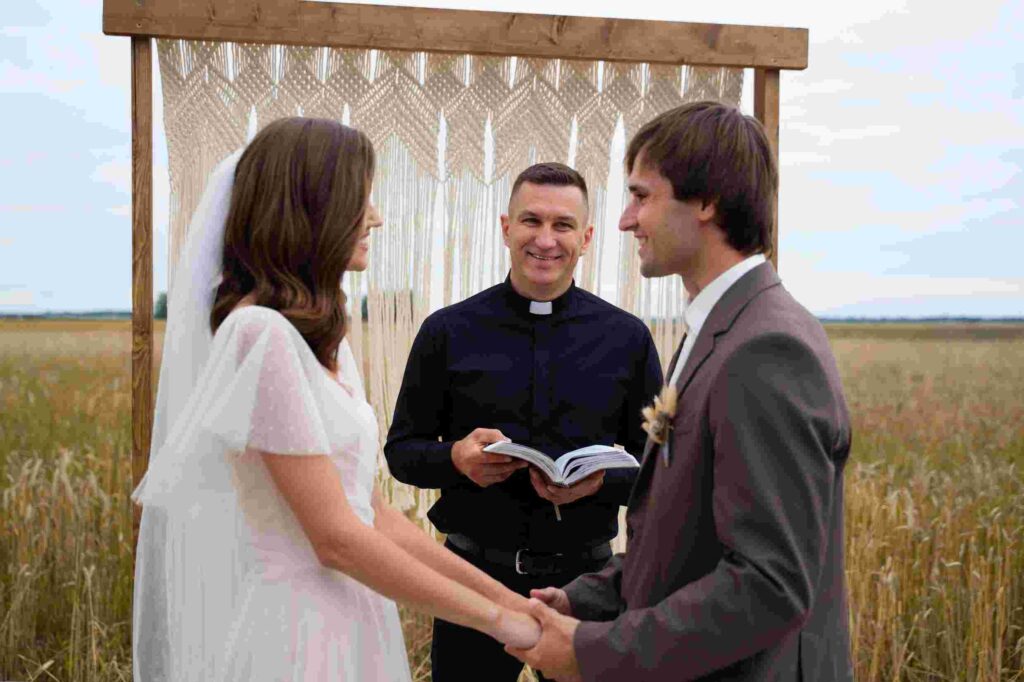Many people want to become ordained ministers. Some do it to help friends and family. Others want to lead wedding ceremonies or follow a spiritual calling. Whatever your reason is, getting ordained is easier than you might think.
In the United States, you don’t always need years of study or a degree from a seminary. Today, you can become an ordained minister online and legally perform wedding ceremonies in many states. But it’s important to follow the correct steps, understand the law, and prepare for the responsibilities that come with the role.
This guide will walk you through the process, from applying for ordination to performing your first wedding. It’s made simple, clear, and easy to follow—no confusing terms or hidden steps.
Step-by-Step Guide to Become an Ordained Minister and Start Officiating Weddings
1. Decide Why You Want to Become Ordained
Before you begin, it helps to know your reason. Do you want to officiate a friend’s wedding? Are you looking for part-time work? Or maybe you feel called to support others spiritually?
Knowing your purpose can help guide your decisions—like choosing the right organization to ordain you and understanding the kind of ceremonies you’d like to perform.
2. Choose a Legitimate Ordination Organization
You’ll need to find an organization that offers legal ordination. These are often online and open to people of all beliefs. Look for one that clearly states that their ordination is recognized in your state. They should also provide documents and training if needed.
Stay away from sites that charge high fees without giving proper support. A good ordaining body will give you what you need to get started, often at little or no cost.
3. Apply for Ordination
Once you choose the right group, the application process is simple. Most websites ask for your name, address, and email. You won’t need to take any exams or attend classes unless you want to.
After submitting the form, you will often receive an email or digital certificate confirming your ordination. In some cases, they’ll also send a printed certificate by mail.
This is the point where you are officially an ordained minister. But there’s still more to do before you can legally perform weddings.
4. Learn the Laws in Your State
Each state has different laws about who can perform a wedding. In some states, being ordained is enough. In others, you might need to register with a local court or provide proof of your ordination.
Some states require ministers to fill out forms, submit copies of their certificate, or apply for a license before performing a wedding.
Take the time to read the marriage laws in your area. You can check your state or county clerk’s website for up-to-date information.
If you’re wondering how to become an ordained minister, this step is key to making sure your ceremonies are legal and valid.
5. Get the Right Documents and Training
Even if it’s not required by law, it’s helpful to have extra documents—like a minister’s license, letter of good standing, or a marriage officiant guide. These can come in handy if local offices ask for them.
Some organizations also offer short training courses or guides to help you understand how to lead a wedding ceremony. These resources teach you what to say, how to prepare, and how to make the ceremony meaningful and legal.
6. Plan and Practice Your First Ceremony
Now that you’re ready to officiate, it’s time to prepare. Talk with the couple to understand what they want in their ceremony. Ask about traditions, religious elements, or personal vows they might include.
Write a script or outline so you know what to say. Practice reading it out loud to make sure it flows naturally. Rehearsing ahead of time helps you feel confident and keeps the ceremony running smoothly.
7. Officiate the Wedding and File the License
On the big day, arrive early, dress appropriately, and bring any legal forms that need to be signed. Lead the ceremony with care and professionalism.
After the ceremony, make sure the marriage license is signed by everyone required—usually the couple, the officiant, and two witnesses. Then, return it to the county office as instructed. This step makes the marriage legal.
Once that’s done, congratulations—you’ve successfully performed your first wedding!
In The End!
Become Ordained and Lead Meaningful Ceremonies, Whether you plan to officiate once or many times, taking the right steps makes a big difference.
Start by understanding your purpose, finding a trusted ordination organization, and following state laws. From there, prepare with care and perform each ceremony with respect.
If you’re ready to begin this journey, all faith ministry is here to help. They provide online ordination, support resources, and guidance for new ministers looking to officiate weddings across the U.S. With their help, you can take the first step with confidence and start making a difference today.






